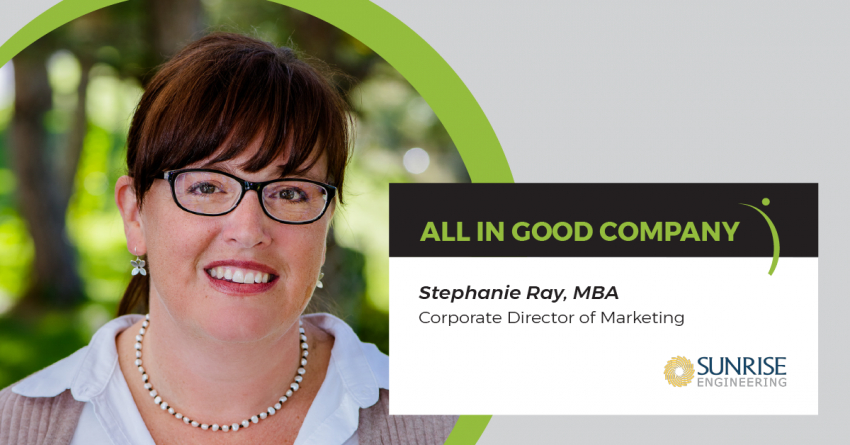Stephanie Ray, MBA—Corporate Director of Marketing
As a firm principal/leader, what have you done to create a marketing mentality in your firm/office?
I started at Sunrise Engineering three years ago. At that time, the company had mostly used administrative staff to assist with marketing efforts, without a lot of marketing background. One of the first tasks that I completed was to build the trust of our leaders and engineers and help them realize that I was a resource for them. I wanted to build a team that was knowledgeable and had expertise in various areas of marketing. I needed to change the mentality that we were word processors and make them understand that a true marketing department was there to guide the company in marketing initiatives. We restructured our marketing department and built a team of experts.
The department went from one marketing director, two coordinators, and a graphic designer to a restructured department that includes me, five marketing coordinators, a graphic designer, an information coordinator, a social media intern, and the utilization of two different consultants when needed for special projects. This long-term goal made it possible to increase the professionalism that was needed to gain the trust of our leadership as well as technical professionals in the level of strategy, branding, and organization our marketing program can offer them. These trained marketing professionals have the education and background that is now respected by the engineers. It was necessary to increase the quality of our work and helped the managers understand that they can utilize the marketing team in a completely different way than they had been previously. Our management has seen a different level of quality, and they are on board with the goals of the department.
We also reorganized our processes to include better quality control and review of marketing materials. They have seen there is value in involving marketing earlier in the process, and we are now tailoring the message with more strategic thinking. We have worked hard to educate the company that marketing is beyond proposals. We have created a better mentality by training on the importance of our overall firm image and our brand. We wanted to make them understand that marketing is in everything they do and how they service the projects and clients. The best marketing they can do is putting forth a quality image to clients on projects and remembering that first impressions are important.
Why do you think marketing in our industry is so important?
It is so important. It can be successful too when our managers realize that marketing is just building relationships. We are such a relationship-based industry. Our firms are full of “doers” that are, for the most part, not comfortable forming those relationships. They want to do the work, not go out and network and meet the people to get the work. Our job is to guide them and help them understand why it is so important to their career path to step out of their comfort zone and build those relationships when it’s not always intuitive to them.
Is there someone who mentored you about marketing mentality?
I have had a lot of mentors in my career. There are two that stand out to me for opposite reasons. Mike Arnes, Vice President with Michael Baker International, was very good at marketing. He had an all-in approach and was always looking to take our marketing efforts to the next level. He was an advocate for marketing and was an example to the technical staff by making marketing ideas important. Mike’s attention to the proposal strategy was very good training for me. Bob Herman, Principal Designer at EDA Architects, was a mentor to me in a different way. He really taught me about the details of design and quality of images and content. He made sure our materials and proposals were well-written and branded. He really helped me elevate my thinking. His appreciation and love for branding was as important to him as the architectural design of the project. I also have met so many mentors through SMPS and other work relationships. Lisa Simons, Keri Hammond, and Fran Pruyn are a few that come to mind. I’ve worked with a few of them one on one, but others I have just observed and learned from their workshops or their example.
How do you show ROI of the marketing program to other firm leaders?
The best ROI that I can explain is the fact that our department has been able to show our firm leaders that we needed so many additional marketing professionals to take the marketing workload off the technical staff and become a tool for them. I am lucky that I don’t have to provide a lot of metrics. I could if I needed to, but my firm leaders have enough trust in the process that they understand that it's all the small tasks that eventually build up to the relationship that wins a project. The social media, conference sponsorships, website updates, brochure edits, proposal templates, corporate branding, etc. that combines to support the result that incrementally builds relationships that win work. It is the whole company that does the marketing, not just one person or one department. This approach has been successful for us.
How do you get non-marketing staff involved in/excited about supporting marketing efforts?
In an effort to change the perception of marketing and build trust, I met with every single service center manager and all the vice presidents one on one. I listened to them. I found out what was working well, got ideas on how marketing could improve, asked them for their wish list of what they would like to ultimately receive from marketing, and asked how we could change things for the better. I helped them understand that we were there for them and I wanted the relationship to be collaborative. I wanted to relieve the responsibilities they had been taking on regarding marketing tasks they didn’t need to do and that we were flexible to accommodate their needs. We have standards and processes, but those can be adjusted if needed.
For example, the company had been trying to implement a CRM program for a long time. It was at a standstill because no one was participating in inputting the information needed. We met with the managers and discovered that the solution was not an “all or nothing” approach to data entry. We worked with them to find out what the most important information was that we needed to collect from the engineers in a collaborative way, and then marketing committed to locating the remaining information without taking away from their billable time. We realized we can catch more flies with honey than with vinegar and treated them like our internal clients. Our CRM program suddenly became important to everyone. This approach was needed to build trust with the technical staff, and they were then happy to get on board.
We also have quarterly manager training meetings, and I present marketing and business development topics at those regularly. I call people and check in and make sure we are meeting their needs. We have good support from upper management now that believes in marketing and that helps more than anything.
>What are three tips you give your marketing coordinators to help them progress and evolve in their role?
1) Establish boundaries. Be firm with your work boundaries so you can meet expectations of your work/life balance.
2) Be confident in your skills. You are working in your position because you are the expert and know what you are doing. The engineers, architects, and contractors are experts in their field, and we respect that. We are experts in our field and our confidence will demand that they respect our role. Guide the technical staff because you are a team with them.
3) Let conflict or criticism roll off like water on a duck’s back. Don’t take things personally. Be professional and realize that everyone has a bad day. Keep your process moving forward and don’t let it get to you. This will gain you respect.
What are the biggest hurdles your team/office/firm faces related to marketing?
1) It’s always a challenge to make timely go/no go decisions. We are getting better but sometimes that decision takes longer than it should so we can keep our process moving forward to ensure quality control.
2) Training the technical staff to not just talk about themselves/our company in the interview is always a challenge and probably always will be a challenge.
3) Getting buy-in when we want to introduce a new aspect of marketing into our overall plan. Social media is an example. It’s hard to get people to change their perspective, but I find success in just being persistent, persuasive, and creative. I was able to somehow get a social media intern to help us this summer without everyone on board. But now, she is doing such a great job that our managers are seeing the benefit of this small addition to our program. It always comes back to showing them the value that can be provided.
What are ways your marketing could improve or reach the next level?
I believe that for us to reach the next level of marketing that is more strategic and bigger picture, we need to create a middle tier of marketing managers. If we could train and promote one to two of our coordinators to become marketing managers that oversee proposals, we could redirect all of our resources to be more effective. Doing this not only gives our coordinators a career path so they will want to stay with us, but it also frees up my time to focus on the wish list initiatives and overall firm strategic direction. The long-term tasks like the website, CRM, our app development, training and all the other non-deadline processes and next level direction would really take our direction to a whole new level.






